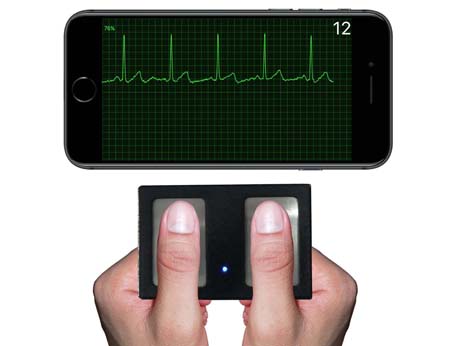
January 1 2018: In an age of increasing anxiety about personal health, we are able to measure many of the key indicators from our homes. Temperature? No big deal, easily done. Blood pressure and pulse rate? Many simple aqrm band BP measuring instruments are available which do both. Blood sugar? Lakhs of diabetics use portable instruments to prick themselves and take a reading. But what about the biggest fear for most of us -- a sudden cardiac episode? Was that pain in the chest a heart attack symptom -- or just acidity? A tricky question that is solved only with a visit to a clinic where they take an ECG. But how often do we put off a visit because of the time, expense and sheer logistical challenge?
Now, thanks to technology, a basic ECG can be self recorded in the comfort of one's home -- then sent to the doctor as a simple email attachment or whatsApp message. Useful in case of symptoms such as heart pain, palpitations and shortness of breath. The built-in electrodes make the portable heartbeat monitor completely cordless. You press the start button and hold the electrodes either in your left palm or on your bare chest below your nipple., for a specific time period. Some models provide two pads on which you press your thumbs, claiming this measures similar to 12 lead hospital systems. The unit displays the trace and transmits the recoded data to your system -- which could be as simple as a mobile phone app. It also auto-evaluates your heart condition. The stored ECG trace can typically be converted to a PDF or jpeg and can be to transmitted to doctor or clinic for expert review. Some units come bundled with a paid and instantaneous analysis service You will find multiple options online --Sanket, AliveCor, Choicemmed, ranging in price from around Rs 5000 to Rs 14,000.
My watch is my ECG! Technology is further shrinking the ECG. Last month AliveCor received Federal Drug Administration (FDA) approval in the US for its ECG Kardia Band, the first medical-grade accessory for the Apple Watch. The Kardia has an integrated metallic sensor in the strap that enables it to communicate with the company's app to take ECG readings, where it can detect abnormal heart rhythm and atrial fibrillation (AF). It costs $ 199.
There is a caveat: These portable ECG machines do not provide the comprehensive multi-lead record of a hospital unit. But it is useful as a pre screen for quick judgment by your care giver on whether you need to come in to the clinic.